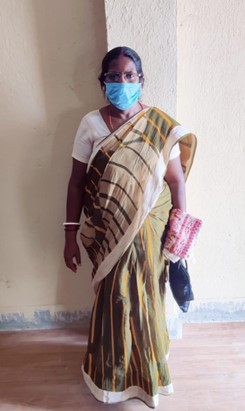Frontline Workers in Jharkhand, India Tackle Gender-Based Violence After Training
Published on June 7, 2022
“Maine aj jo gaair barabari aur hinsha ke bare mesikha wo ja ke sabko bataungi…. (Whatever I learned today during the training about inequality and gender-based violence, I will communicate these in my community.”) -Toshila Tirkey, Community Health Worker, Jharkhand, India
These are the words of Toshila Tirkey of Hurhuri Panchayat, Ratu Block, Ranchi, Jharkhand who was moved to action by a gender-based violence (GBV) training she recently attended.

Toshila, 43, hails from a small village where GBV is quite common. Toshila explains, “Harmful gender norms contribute to gender-based violence due to alcoholism and early marriage of girls.” Even though Toshila wanted to help women in her village, she did not know how.
MOMENTUM Safe Surgery in Family Planning and Obstetrics, through its Gender-integrated Response to Emerging COVID-19 Priorities in India Project, is training frontline workers (FLWs) on GBV prevention and response strategies. Frontline workers felt ill-equipped to deal with those facing GBV due to lack of knowledge about preventive measures and actions they could take.
In five different participatory and activity-based sessions, the MOMENTUM training covered gender-based violence as a concept, its forms and prevalence, the cycle of violence, and identifying victims and perpetrators of violence. At the end of the training, FLWs understood how and when to refer those affected for support and care to the One-Stop-Centres (OSC). OSCs are institutions set up by state governments that support women affected by violence, in private and public spaces, and within the family, community, and in the workplace. Women facing physical, sexual, emotional, psychological, and economic abuse—irrespective of age, class, caste, education status, marital status, race, and culture are given support and redress. Aggrieved women facing any kind of violence due to attempted sexual harassment, sexual assault, domestic violence, trafficking, honor-related crimes, acid attacks, or witch-hunting are provided with specialized services.
The training equips frontline workers to discuss the implications of gender-based violence during their community meetings. They are also provided with three interventions to prevent GBV. These include: identifying and working with youth champions in selected villages; engaging with men and boys; and engaging with community-based women’s groups and community institutions. All of these groups will receive training on gender and their roles and responsibilities within the community to prevent gender-based violence.
Post-training, Toshila said she felt more capable and was able to empathize more with GBV incidents. She began using different village-level forums like self-help group (SHGs) meetings, village health and sanitation days, and Anganwadi Centres to spread awareness among community members, so that they help themselves and can stand up for each other in such situations.
Through August 2023, MOMENTUM trained over 78,000 community health workers and supervisors in GBV prevention, referral, and response.

